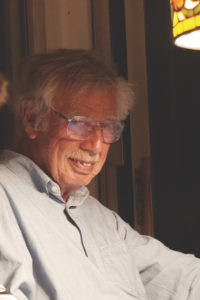TRURO — The Outer Cape is one of the few places on the East Coast where the setting sun is visible over a water horizon. For Kosta Tsipis, enjoying the evening light from his deck with a glass of wine in hand and good company was one of life’s great pleasures.
Tsipis, one of the world’s foremost scholars on nuclear disarmament and arms control, died at his home in Lasell Village in Newton on Nov. 7, 2020, at age 86. He was the former director of the program in science and technology for international security at M.I.T.

Born in Athens, Greece, in 1934, Kosta lived through World War II and the Greek Civil War as an adolescent. Those early experiences, coupled with an interest in physics that he developed from stargazing as a child, sparked his professional aspirations.
“Wartime was something that was very present and very scary to him as a young child,” said Judith Tsipis, his wife, from their home in Truro. “He was determined to use his physics to make the world safer and less likely to go through nuclear war.”
After completing high school in Greece, Kosta received a scholarship to Rutgers University and arrived in the U.S. for the first time in 1953.
“I think it’s the American dream,” said Judith. “He came over as an immigrant without any money. But he had a lot of self-confidence, and he was obviously extremely bright.”
Tsipis completed both his bachelor’s degree in electrical engineering and master’s in atomic physics at Rutgers and received his Ph.D. in high-energy nuclear physics from Columbia University in 1966. He subsequently joined the physics dept. at M.I.T., where he met Judith Ebel, then a graduate student in biology. They were wed in December 1970.
Over the span of his career, Prof. Tsipis distinguished himself as one of the world’s pre-eminent thinkers on nuclear arms control. In 1984, he received the American Physical Society’s Leo Szilard Lectureship Award for his research on nuclear disarmament during the Cold War. He was a vocal advocate for limiting nuclear arsenals, using the tools of physics to demonstrate the devastating effects of nuclear war. He served on the board of the Council for a Livable World, the Peace Research and European Security Studies Institute, and the Stockholm International Peace Research Institute, among other prominent positions.
He was a brilliant teacher and gifted lecturer. One of Prof. Tsipis’s great talents was taking highly technical ideas in physics and explaining them in a way that was understandable to his students and the general public. He authored a comprehensive catalogue of technical academic articles and papers during his tenure at M.I.T., as well as five books.
“By and large, instead of writing in scientific journals for a small population [of academics], he really focused on writing for the general public,” said Judith. “He wrote 10 articles for Scientific American. He even wrote one article on the Star Wars [defense initiative] under Reagan for Playboy magazine.”
Kosta and his wife had three sons, one of whom, Andreas, died in 1998 from Canavan disease, a rare developmental disorder. In large part because of her experience raising Andreas, Judith founded the Genetic Counseling Program at Brandeis University in 1992, and Kosta also taught there for nine years. He is survived by his wife; his two living sons, Yanni and Mikael; and four grandchildren.

Tsipis first came to the Outer Cape in 2002. The couple had decided to purchase a vacation home, with the only stipulation being that it must have a view of the sun setting over the water. Despite the fact that neither of them had ever been to Cape Cod before, they purchased a bayside home in North Truro, and spent their time off here for the next 18 years.
“We just fell in love with it,” said Judith. “It’s a beautiful home, and we did a lot of entertaining here on the deck. Those are special times.”
Above the doorway of the Tsipises’ Truro home hangs a sign bearing the Latin phrase hic habitat felicitas, meaning “here lives happiness.” The same phrase is inscribed on a sign found in the ruins of Pompeii atop the remains of the city’s largest brothel, where it is accompanied by a prominent phallus. The Tsipises’ sign instead pictures a seashell — a nod to the original and an example of Kosta’s sense of humor.
“Truro was an idyll, and this was an idyllic time in his life,” said Jane Leavy, a neighbor and friend. “Kosta was magnetic. He was gallant and courtly and old-world. I’m honored to have been his friend.”



